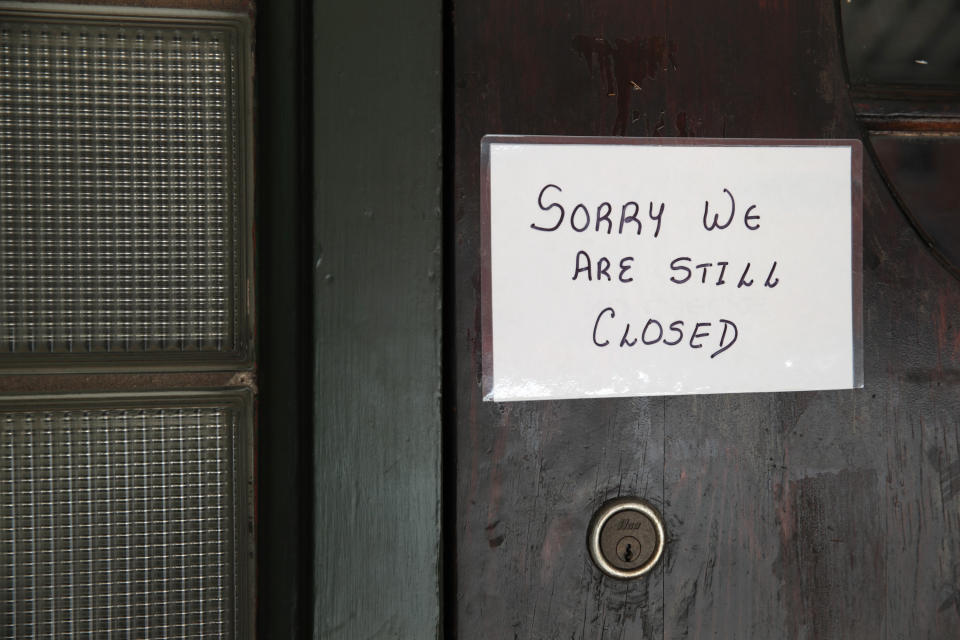Job losses hit low-income households particularly hard, Fed finds
The Federal Reserve says nearly 40% of people in households making under $40,000 a year lost their jobs in March, illustrating the damage the COVID-19 crisis has inflicted on low-income families.
The Fed on Thursday released new data showing the ripple effects of the unprecedented scale of job loss that had more than 36 million Americans turning to unemployment insurance over the last two months.
In its Survey of Household Economics and Decisionmaking, the Fed reported that over one-third of adults who reported job loss or a reduction in hours expect difficulty in being able to pay their bills.
Prior to the pandemic, three in 10 adults said they were already unable to cover three months of expenses using their savings or borrowing if they lose their jobs, underscoring the stress that the massive layoffs place on American households.
Fed Chairman Jerome Powell has emphasized the specific impact on lower-income Americans, previewing the data in a speech yesterday.
“The numbers show clearly that it’s more recent hires and lower paid people who are bearing the brunt of this, although people are suffering all across the income spectrum,” Powell said in a webcast on Wednesday.
Powell said the data is “particularly painful” within the context of the longest economic recovery in U.S. history, which came to an abrupt end with the novel coronavirus. Prior to the pandemic, the U.S. unemployment rate touched 50-year lows at 3.5%.
Ill-prepared to get ill
The Fed’s survey is usually done in October each year, but central bank researchers conducted a smaller supplemental survey between April 6 and 9 this year to measure the impact of the pandemic.
The additional survey shows that as of early April, 19% of adults reported losing a job, being furloughed, or having their hours reduced - a measure close to the 22.8% U-6 unemployment rate reported by the Bureau of Labor Statistics last Friday.

But the survey interestingly points out that many workers elected to take on fewer hours or leave their jobs.
Eighteen percent of those workers said illness or health limitations contributed to their reduction in hours or departure from their jobs, and another 22% cited family responsibilities or needing to take care of their children.
The report also suggests that many workers are facing the prospect of keeping their jobs but getting sick without pay. The survey says one in five employed adults said they did not have any paid leave to use if they got sick with coronavirus, underscoring the challenge for particularly low-income workers that may not be able to cover healthcare costs.
One bright spot in the report was worker optimism over being able to return to their jobs at some point.
Among those who lost a job in March 2020, 91 percent anticipated that they would return to work for the same employer or indicated that they had already returned to work.
But the survey noted that “it is difficult to predict, however, how long layoffs will ultimately last.”
Recovery ‘may come more slowly’
The Fed has been particularly interested on the distributive effects of the COVID-19 crisis. The Federal Reserve Bank of San Francisco reported earlier this month that jobs loss among low-income communities was compounded by concerns over access to critical health resources and meeting basic needs like food and housing.
The report, separate from the forthcoming one cited by Powell, noted that 35% of respondents do not expect their communities to return to normal within a year.
Powell said he has been in touch with non-profit and for-profit organizations that have expressed concern over the ability of the economy to quickly bounce back.
“There is a growing sense that the recovery may come more slowly than we would like but it will come,” Powell said.
Powell expressed specific worry over a widening of the skills gap as the unemployed sit on the sidelines, which could exacerbate the ability of those people to get back to work when the recovery comes. Powell said a prolonged recession and a weak recovery would have massive ripple effects on the U.S. economy, raising the stakes for the Fed and fiscal policymakers in Congress and the White House to do more.
Failure to do so would lead to “lasting damage,” Powell warned.
“The result could be an extended period of low productivity growth and stagnant incomes,” Powell said.
Brian Cheung is a reporter covering the Fed, economics, and banking for Yahoo Finance. You can follow him on Twitter @bcheungz.
Black-owned businesses will see extended 'challenge' even after pandemic ends
St. Louis Fed's Bullard: US economy can return 'pretty close to normal' in Q4
St. Louis Fed's Bullard: Negative interest rates would be 'problematic' in US
A glossary of the Federal Reserve's full arsenal of 'bazookas'
Read the latest financial and business news from Yahoo Finance
Follow Yahoo Finance on Twitter, Facebook, Instagram, Flipboard, SmartNews, LinkedIn, YouTube, and reddit.
